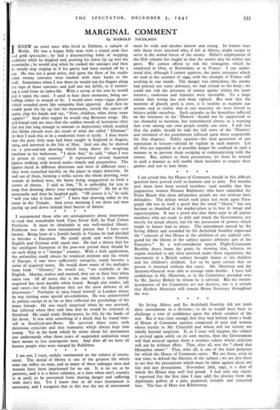I am proud that the House of Commons should in
this difficult question have proved itself so humane and so alert. For months past there have been several members (and notably that fine pugnacious woman Eleanor Rathbone) who have reminded the Front Bench that these defenceless people are not without their defenders. The debate which took place last week upon Para- graph as was in itself a proof that the word " liberty " has not become so thumbed in the market-place as to lose its image and superscription. It was a proof also that there exist in all parties members who are ready to defy and attack the Government, not merely for actual abuses, but for the possession of powers which might in future lead to abuse. The amendment moved by Sir Irving Albery and seconded by Sir Archibald Southby expressed the "concern of this House at the abolition of any judicial safe- guard for the liberty of the subject against arbitrary acts of the Executive." In a well-considered speech Flight-Lieutenant Boothby drove home the point, by showing that, whereas no stigma attached to any alien interned under these regulations, the internment of a British subject brought shame to his children and his children's children. Let us be quite certain that no person is interned without due cause. Mr. Morrison and the Attorney-General were able to assuage some doubts. I have full confidence in Mr. Morrison, as in the Committee presided over by Mr. Justice Birkett by whom he is advised. But the recom- mendations of the Committee are not decisive, nor is it certain that Herbert Morrison will remain Home Secretary throughout the war.
* * * *






















 Previous page
Previous page